Why is your newborn crying inconsolably?
Most first-time parents ask this question. Unfair as it may sound, newborns know only one language to communicate and that is “Crying.”
Hearing a baby cry is the most challenging part of parenting. There are days when you have to push hard on yourself to stay composed so you can actually be receptive to your child’s needs.
With all those postpartum hormones, sleep-deprived days and nights, and new mom exhaustion, it is very normal to feel agitated to hear a baby crying constantly. Sometimes you see your efforts are not working anymore to console a baby.
Babies do not always cry due to one particular reason. Since every baby is different, you will learn as you go. Some babies may cry more than usual, while a few are cool as a cucumber.
Typically, most babies cry for some very obvious reasons like hunger, dirty diaper, and gas issues, but you may notice some would not even bother diaper change and go hours without crying.
In this post, you will learn about the common reasons your baby might be crying.
This post may contain affiliate links. Please read our disclaimer for more information.
What are the reasons for the baby crying
Some people naturally have less tolerance for hearing the baby crying, so if you are one of them, you have to put yourself together to help a crying baby.
1. Baby is Hungry
Ideally, newborns need to be fed every two hours. Breastfed babies tend to get hungry within 60 to 90 minutes after every feed. Try to nurse or feed the baby (breastmilk or formula) every two hours to establish a healthy eating schedule. However, once you establish your milk supply, keep stretching more and more time in between feedings.
Formula-fed babies may take longer (about 3 to 4 hours) to get hungry again. As new parents, it is very important to understand the feeding schedule to encounter less crying.
Also, crying increases hunger, so let your baby cry for a couple of minutes to have an awesome feeding session.

Keep in mind, your baby may have growth spurts with time. Baby wants more feed as they grow – For that reason offering another 2 ounces of feed wouldn’t hurt if your baby keeps waking up from sleep – not as scheduled.
Using a Pacifier can be helpful for babies who want to suckle most of the time. Be mindful that you can delay introducing a pacifier to your newborn for the first couple of weeks until moms develop an adequate milk supply.
Check out this Ryan and Rose Cutie PAT Pacifier for newborns.
2. Dirty Diaper
Newborns poop all day long. You can expect to change 10 to 15 diapers in a day.
Some babies would not even care even if they are messy, however, some get really irritated the moment they poo. You will soon find out what category your baby falls into, former or later.

Pampers Swaddlers have a pee detector, you can easily find out about a wet and dirty diaper.
Once your baby turns a few months old, you can switch to pampers cruisers, Although cruisers do not have any detector, you may notice cruisers have a better fit and absorption than any other diapers.
Simple tips to prevent diaper blowouts for the babies.
3. Baby is Tired or sleepy
The baby might be tired and prefers to sleep rather than eat. For that reason, keeping a baby on a rock-solid feeding and sleeping schedule – right from the start- is very important.
Sometimes, the baby gets so much tired that she does not fall asleep simply because of overstimulation throughout the day. Having your baby nap during the day is equally essential. They say, for babies – Sleep begets sleep.

As a new parent, you should not make sleep mistakes from the start of your motherhood journey. Get this sleep ebook and see how you can undo your sleep mistakes with your baby.
Another category is when your baby keeps waking up when you put your baby to sleep, or having trouble falling asleep regardless, CHECK Baby diaper again.
If your baby happens to be a light sleeper, wakes up with every little noise, I would highly recommend using a noise machine. This was a game-changer for my kids and for me too. Especially, if you have a loud snorer sleeping next to you.
This is the sound machine I use. It is reasonably priced, not too expensive, and works great for my kids. Besides, it can get you some sleep, it is travel-friendly, very lightweight, and super portable. You can actually take it anywhere you go and your baby can sleep like she is at home.
Check out my post on mommy mistakes about newborns.
19 Mistakes First-time parents could make with babies.
4. Baby has Gas Issues
Gas issues in newborns can be a big deal sometimes, just like bloating can get a little too much for adults too. Since newborns are normally laid back, they don’t get to move a lot, also their digestive system is still developing and learning to digest what they eat.
Learn more about how to relieve gas issues in babies.

Massage the baby’s tummy and legs every night with Earth Mama’s baby oil to help her relieve gas issues. Once the baby learns to stretch and moving around, gas issues go down significantly.
I understand it is not backed by science or researchers, but I have strongly witnessed the impact of gassy food for the first six weeks when the baby’s digestive tract is maturing. Gassy food may trigger gas issues in babies if you are breastfeeding and the food is new to the baby.
Necessarily, this does not mean that you should not eat your favorite broccoli or chickpeas while you are breastfeeding for 2 to 3 years. All you have to do, avoid such foods that could make you bloated for the first six weeks. Otherwise, your newborn is going to cry, but eventually, get used to it.
With that being said, your baby’s cries will significantly reduce within a few months as the digestive tract become stronger and healthier.
I have been using gas drops by little remedies or nighttime gripe water by mommy bliss. I highly recommend it.

5. Colic
Colic is a different condition than gas, if your baby is colic, she is going to cry for about more than three hours a day, more than three days a week, and more than three weeks. Colic babies tend to cry inconsolably for hours, sometimes for no apparent reason that you could help. They are going to cry when they have to cry.
The good news is they are going to grow out of this colic issue within a few months.

Colic is related to gas discomforts. Baby has trouble passing gas, or sometimes it is the mother’s diet that needs attention. For colic babies, you need probiotics and feed them more often without having them get hungry.
Here are more helpful tips if you have a tough colic baby. How you can soothe and calm a colic baby.
6. Acid reflux
Rarely, you may notice the baby gags if she is on her back after a feed, or the food comes back in the esophagus due to an immature digestive system. Not every baby has acid reflux. In order to prevent throwing up after being fed, here is what you need to do.
- In the case of reflux, babies need to stay slightly elevated after every feed. Once the baby gets a little over a month old, reflux issues subside.
- Acid reflux babies need to be fed slowly, give half feed, burp, and then feed again.
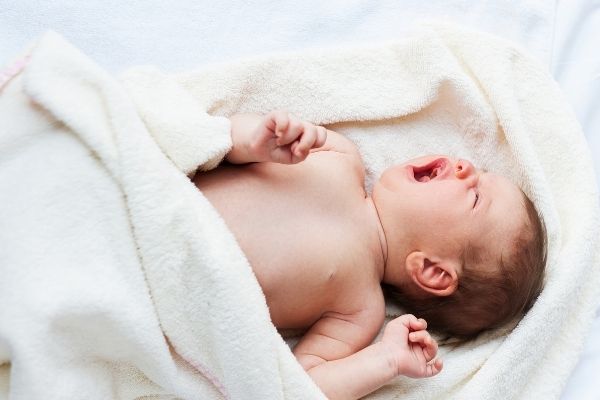
Sometimes the baby manages to cry out loud, or in rare cases, she might go unconscious and throw up eventually. For babies who have acid reflux, do not try the cry-it-out method to develop a sleep schedule.
A baby crying is always an indication of something you should never ignore.
Learn more
Why is your baby throwing up so much and how much throw up is normal.
7. Need to Burp
Once you feed and burp your baby, you put her down to sleep. After some time your baby starts crying again because she needs to burp again.
When babies grow out of the stage of infancy, they usually burp as they start sitting up. Here is what you need to know about how to solve gas issues for your baby.

8. Room temperature may be too high or too low
Sometimes the baby doesn’t sleep, and she seems to be so much clingy. She may want to be held up all night. One of the reasons could be the room temperature. Make sure it is not too hot or not too cold – ideally, between 68 degrees Fahrenheit to 72 degrees.
Be mindful of crib placement, if you have a vent opening up directly on your child’s crib or bed, it could possibly interrupt your baby’s sleep.

Read more
What are the sleep mistakes you are making with your baby?
9. Teething
The teething process may start when the baby is a few months older. Every baby has its own teething timeline. Some babies do not feel too much pain, whereas, it is really painful for some babies and you can expect a lot of whining and crying.
If your baby is in pain because of teething and refusing a bottle no matter how hungry she is, consider switching to a different bottle. Having a soft nipple bottle should help.
I would not suggest you use any oral gums gels for teething. Lately, teething gels containing benzocaine have been removed from the store all over the US, as they have serious risks for babies.

Read more
Why is your baby refusing bottles and not eating?
10. Illness
If your baby is having episodes of crying, and she does not seem to be settling down, then you have to see if there is any sign of illness, like cold, congestion, ear infection, or fever, etc.
Sometimes it is due to a dry nose. Try using saline drops at night.

You should always have a medicine kit ready for the baby.
Syringe bulb for regular boogie suction.
Read more
How you can treat cold and flu in babies.
Note: if your baby does not have any signs of cold or flu but still has a fever, you should always get it checked. Most of the time, it is a sign of ear infection and your baby has to take antibiotics in order to treat any kind of infection.

11. Other discomforts
There could be some other discomforts like itchiness, diaper rash, some clothing tags might be bothersome, you have to keep inspecting if there is non-stop crying. Just to stay less worried about such issues, do not use clothes that are rough from the inside and mess up with the baby’s skin.
Always make sure the clothes are comfortable, babies should not be dressed up in too tight accessories like shoes, hairbands, hats. The trousers should always be comfortable enough on the tummy to pass gas easily.
Babies love routine. When you follow a particular routine with your baby, it is very likely that if you skip anything, they might notice and cry. For instance, if you bathe your baby before bedtime for about a couple of weeks or more and you might want to skip it for a day, it is very likely your baby is going to feel that change or cry for it if not done. some babies might not bother, while some would.
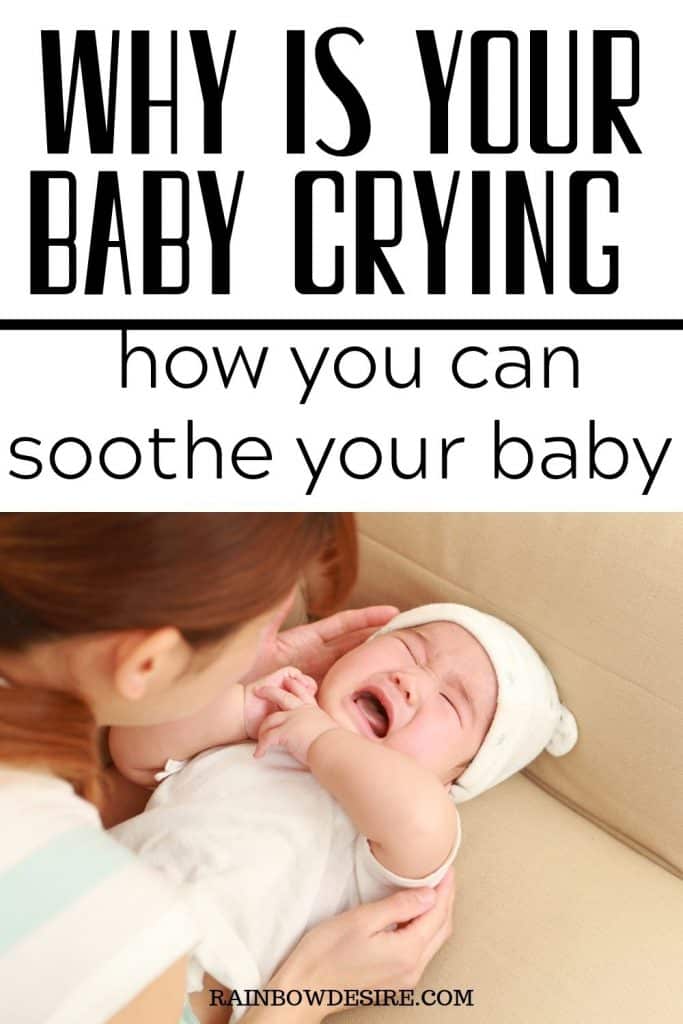
12. Overstimulation or change of environment
Babies are comfortable in their own surroundings. when they are taken to places that are noisy, cluttered, parties and events that are having too many grownups holding them, or having too many lights or music: they get overstimulated and cry their lungs out.
The best solution is to leave, take them for a drive, ideally HOME, and wait until they get a little older to handle all this anxiety. Those babies who do not experience any daycare are more likely to have this anxiety until they get to the age of three.
13. Baby Needs Attention
Babies crave your love and care. Showing love by showering them with hugs and kisses is not going to spoil anyone. Sometimes babies cry because they are craving attention and they don’t want to stay in their bouncer or crib for that long.
Hold them, offer a toy, introduce a pacifier if you feel there is a need.
Getting a newborn care book is a great idea. Babies love to hear their Mamas reading to them. Give it a shot and give them your undivided attention as much as you can.
How you can help to soothe crying baby
1. Give baby a soothing massage, on legs back, and tummy.
2. Cuddle, rock, hug as long as you can.
3. Try bicycle moves or a nice bouncer should help.
4, Give baby a warm bath.
5. Take baby for a ride in a car. A moving vehicle could help soothing crying babies.
6. During the summer, be mindful, you should not overdress your baby.
7. Swaddle or wear your baby or else lay baby down on her stomach rather than on the back for a while.
8. Last but not least offering baby a pacifier who just wants to suck on breast or bottle. Pacifier is not recommended for the first 4 to 6 weeks until moms establish a good milk supply.
You should keep a close eye on your baby. Call your doctor if you see signs of any health condition.
Let me know in the comments what have been your struggles and your reasons for a crying baby. How did you manage to soothe?

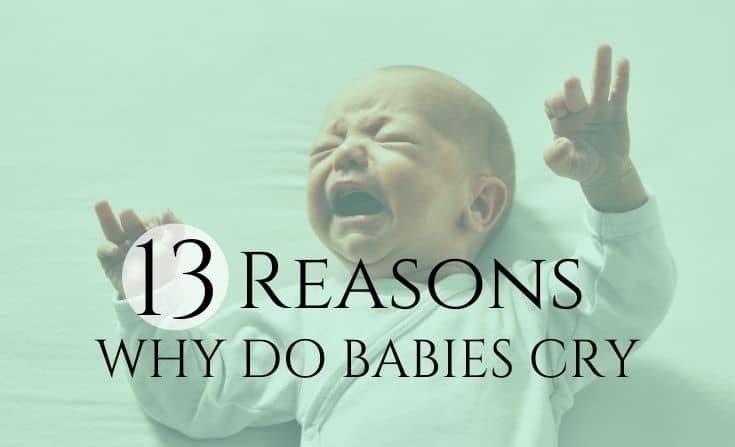
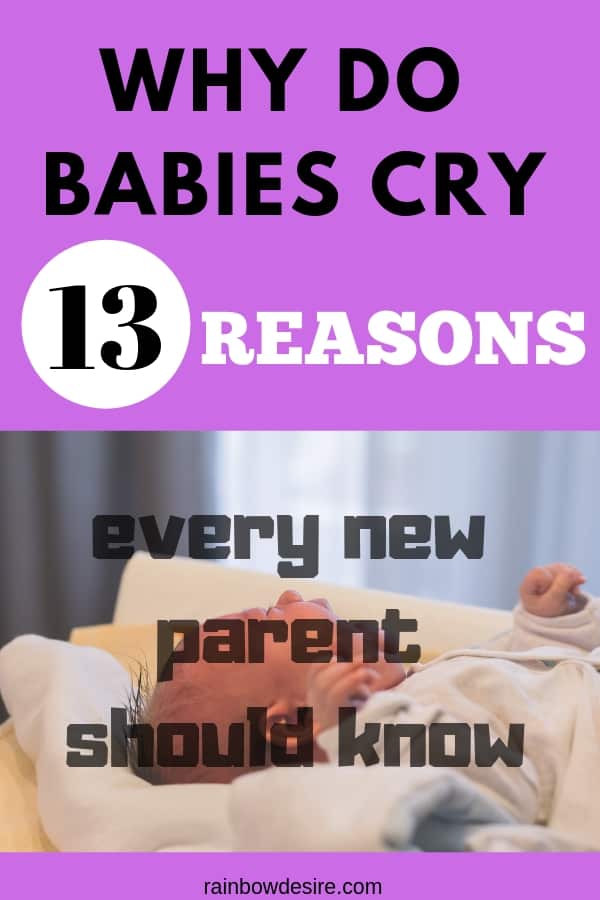
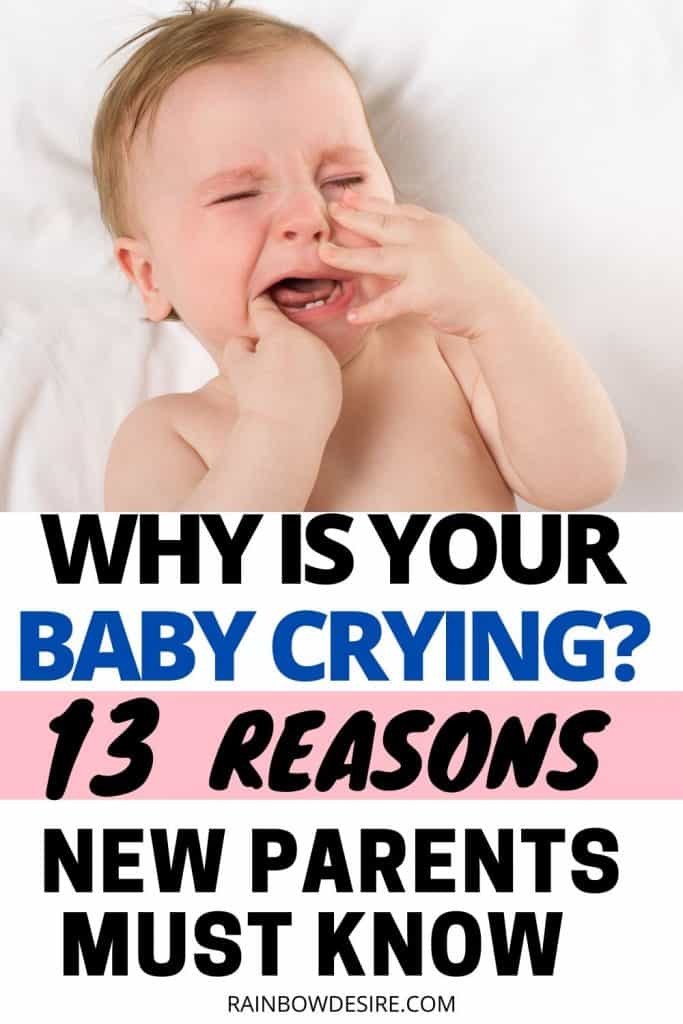



6 thoughts on “13 reasons why do babies cry – How to soothe a crying baby”